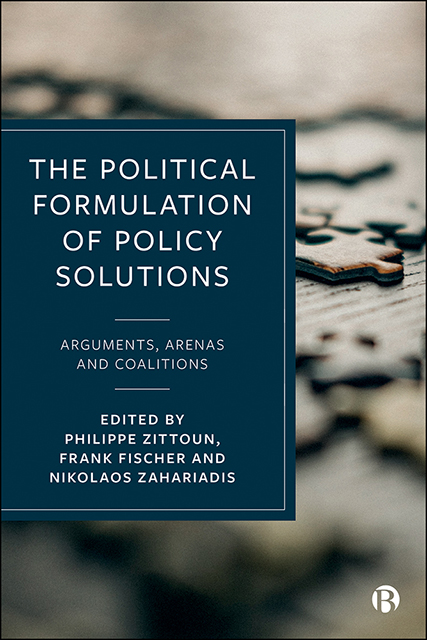Book contents
- Frontmatter
- Contents
- Notes on Contributors
- 1 Introduction – Policy Formulation: A Political Perspective
- 2 Upcycling a Trashed Policy Solution? Argumentative Couplings for Solution Definition and Deconstruction in German Pension Policy
- 3 Binding and Unbinding Problem– Solution Associations in US Agricultural Policy Making: The Introduction and Demise of Direct Payments to Farmers
- 4 The Role of Expert Reporting in Binding Together Policy Problem and Solution Definition Processes
- 5 Coalitions and Values in the Flow of Policy Solutions
- 6 The Marks of Ownership: The Promotion of Carbon Capture and Storage in France
- 7 Anticipating Public Approval in the Binding of Immigrant Integration Problems and Solutions
- 8 Discourse Coalitions and the Messiness of Policy Solutions: College Governance in Nevada
- 9 Policy Solution Ownership: Road-Space Re-Allocation as a New Approach to Urban Mobility
- Index
3 - Binding and Unbinding Problem– Solution Associations in US Agricultural Policy Making: The Introduction and Demise of Direct Payments to Farmers
Published online by Cambridge University Press: 21 April 2023
- Frontmatter
- Contents
- Notes on Contributors
- 1 Introduction – Policy Formulation: A Political Perspective
- 2 Upcycling a Trashed Policy Solution? Argumentative Couplings for Solution Definition and Deconstruction in German Pension Policy
- 3 Binding and Unbinding Problem– Solution Associations in US Agricultural Policy Making: The Introduction and Demise of Direct Payments to Farmers
- 4 The Role of Expert Reporting in Binding Together Policy Problem and Solution Definition Processes
- 5 Coalitions and Values in the Flow of Policy Solutions
- 6 The Marks of Ownership: The Promotion of Carbon Capture and Storage in France
- 7 Anticipating Public Approval in the Binding of Immigrant Integration Problems and Solutions
- 8 Discourse Coalitions and the Messiness of Policy Solutions: College Governance in Nevada
- 9 Policy Solution Ownership: Road-Space Re-Allocation as a New Approach to Urban Mobility
- Index
Summary
Introduction
In the domain of agriculture in the United States (US), a ‘window of opportunity’ for policy debate and change opens up approximately every four to five years. The Farm Bill expires after that period, unless it is extended or reauthorized by Congress, usually resulting in a ‘new’ Farm Bill. Failure to do so would result in many farm programmes ceasing to operate, while other programmes would revert to the provisions from the permanent law from the 1938 and 1949 Farm Bills, which would force the government to apply outdated price support levels for some commodities, for example. The need to authorize a Farm Bill to secure funding for existing programmes, combined with the negative repercussions of this ‘sunset clause’, secures that farm legislation is a regular topic on the political agenda.
Despite being periodically up for debate, agricultural policy is an area par excellence where policy change tends to be difficult and incremental rather than far-reaching. This policy stickiness is often attributed to a policy network favouring powerful farm interest groups who prefer state intervention, while retrenchment is periodically enabled by incentives emanating from budgetary problems and trade conflicts (Moyer and Josling 2002; Josling and Tangermann 2015). While these material and institutional factors are certainly important in explaining developments in agricultural policy, they have difficulty explaining why, at specific points in time, certain policy instruments rather than other alternatives were successfully constructed as appropriate and feasible policy solutions, became part of the dominant discourse, and were eventually turned into the selected policy outcome. Moreover, sometimes these new policy solutions became the object of much contestation almost as soon as they were implemented, resulting in vigorous political debate and a fluctuation in policy instrument mixes through the discontinuation of policies and the reintroduction of ‘new’ alternative policies – or old policy instruments in new guises – over time. The introduction and development of the policy instrument of decoupled direct income payments for farmers throughout four consecutive Farm Bills between 1996 and 2014 is a case in point. From its introduction as a temporary measure in the 1996 Farm Bill, it evolved into a fixed component of the farmers’ safety net in the 2002 Farm Bill, after which it took opponents of the policy instrument two Farm Bills to achieve discontinuation of the direct payments in favour of alternative farm support instruments.
- Type
- Chapter
- Information
- The Political Formulation of Policy SolutionsArguments, Arenas, and Coalitions, pp. 45 - 72Publisher: Bristol University PressPrint publication year: 2021

